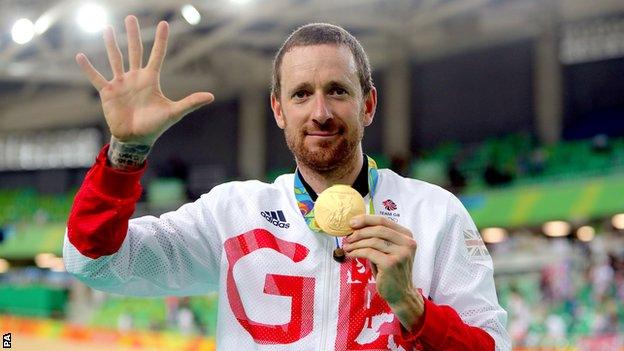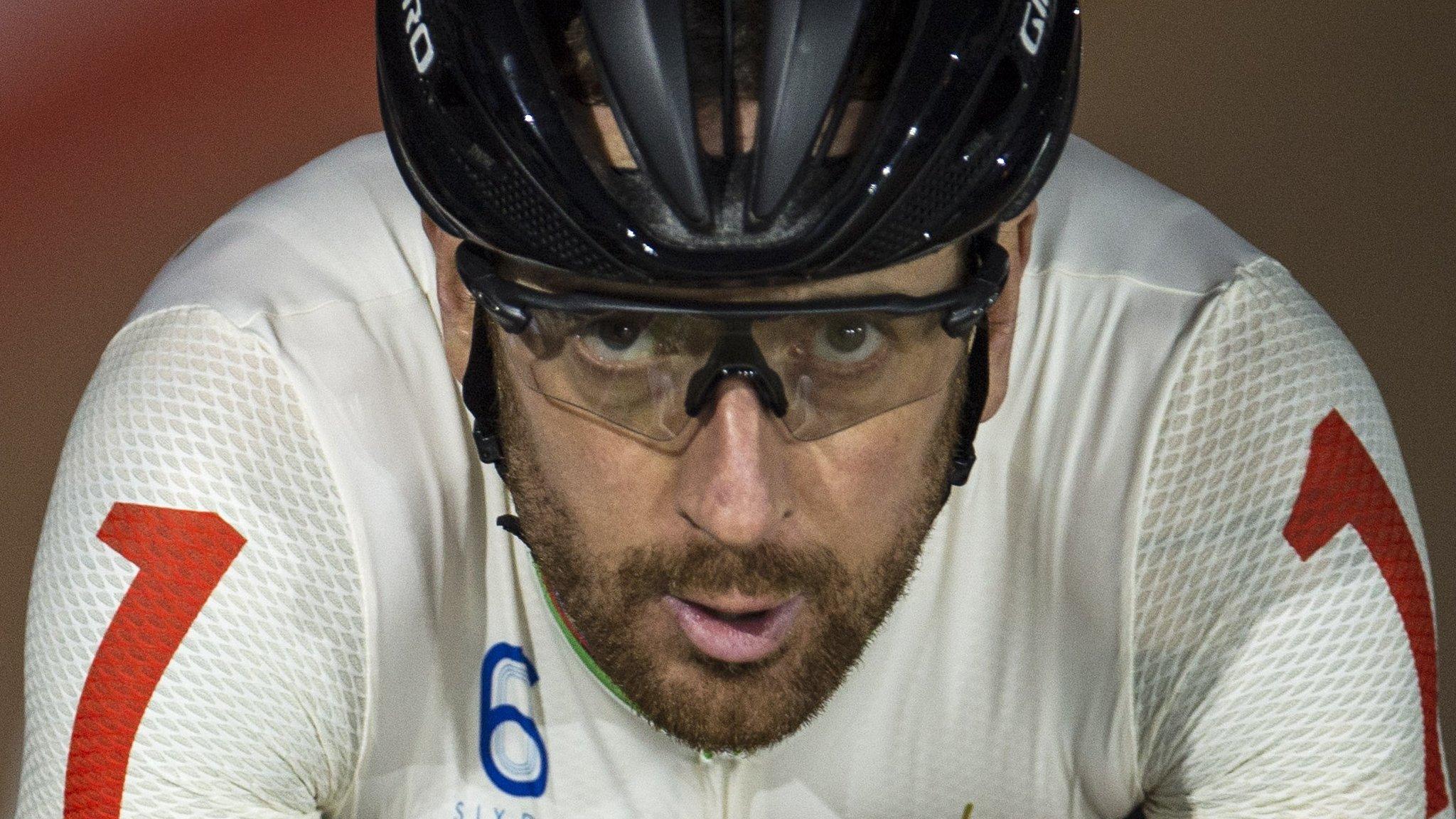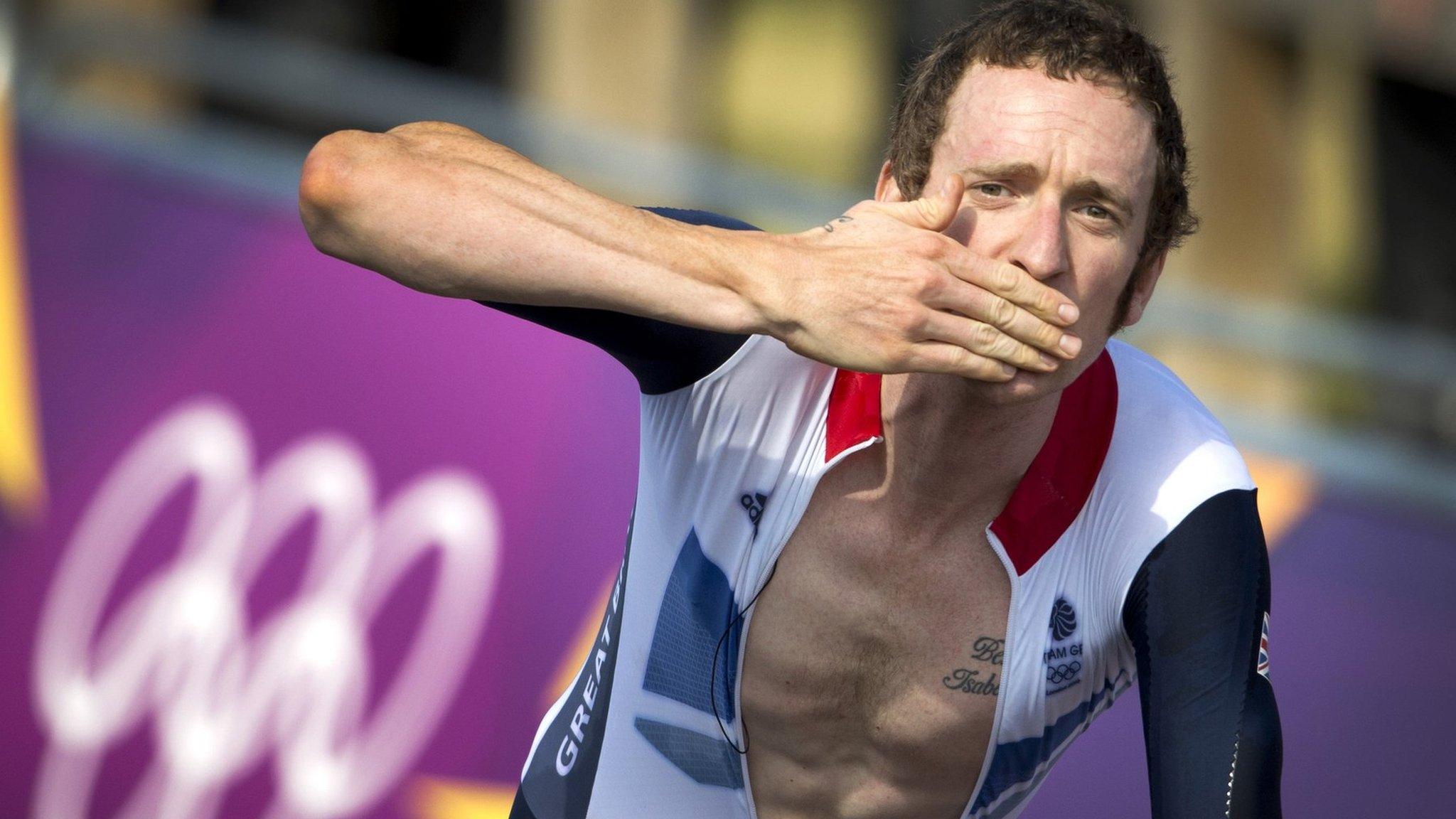Sir Bradley Wiggins says his life was 'living hell' during Ukad investigation
- Published

Sir Bradley Wiggins won five Olympic gold medals, as well as a silver medal and two bronze medals
Sir Bradley Wiggins said his life was "a living hell" during an investigation into allegations of wrongdoing at British Cycling and Team Sky.
On Wednesday, UK Anti-Doping said there would be no charges over a "mystery" medical package delivered for Wiggins at the Criterium du Dauphine in 2011.
Wiggins, 37, said the investigation "felt nothing less than a witch hunt".
He added: "Being accused of any doping indiscretion is the worst possible thing for any professional sportsman."
Wiggins won five Olympic gold medals and the 2012 Tour de France before retiring from cycling in December 2016.
It was alleged that the package that was the focus of the investigation contained a banned substance - but the doctor involved, Dr Richard Freeman, said it was a legal decongestant, Fluimucil.
The 14-month investigation has been closed and a Ukad statement said it would only "revisit matters if new and material information were to come to light".
Ukad said it was unable to "definitively confirm the contents of the package" because of a "lack of contemporaneous evidence".
Its chief executive Nicole Sapstead said the investigation was hindered by the "lack of accurate medical records" held by British Cycling.
Wiggins, British Cycling and Team Sky have always denied any wrongdoing.
'It has felt nothing less than a malicious witch hunt'
Wiggins said in a statement:, external "I welcome Ukad's confirmation that no anti-doping charges are to be brought regarding the so-called 'jiffy-bag' allegations.
"It has always been the case that no such charges could be brought against me as no anti-doping violations took place. I am pleased this has finally been confirmed publicly.
"This period of time has been a living hell for me and my family, full of innuendo and speculation. At times it has felt nothing less than a malicious witch hunt."
Wiggins, who said he would assess potential legal options, was unhappy with Ukad's statement and questioned the body's decision to begin an investigation.
"To say I am disappointed by some of the comments made by Ukad this morning is an understatement," added Wiggins. "No evidence exists to prove a case against me and in all other circumstances this would be an unqualified finding of innocence.
"Where did the information come from to launch the investigation?
"Who was the source? What exactly did that person say and to whom?
"Why did Ukad deem it appropriate to treat it as a credible allegation?"
Analysis - 'wholly unsatisfactory end'
BBC sports editor Dan Roan
With no clarity over what was in the now-infamous jiffy bag delivered to Team Sky in 2011, this represents a wholly unsatisfactory end to a saga that has tainted some of the biggest reputations in British sport, and exposed Ukad's lack of power.
Its statement is deliberately nuanced, falling short of an exoneration of those involved, much to Sir Bradley Wiggins' dismay in a blistering statement, despite Britain's most decorated Olympian facing no charges.
But while the end of the investigation will come as a relief to many in the sport, the lack of medical records, the inaccuracies in Team Sky's initial explanations for the mystery delivery, the unavailability of key witness Dr Richard Freeman to Ukad investigators, the theft of his laptop, and the medical exemptions that Wiggins had before major races, all mean that suspicion will linger. The close relationship between Team Sky and the governing body (who still share headquarters in Manchester) is also again under scrutiny.
And at best, the attention to detail that was once the mantra of Team Sky and British Cycling has been exposed as hollow.
How did this issue arise?
In October 2016, the Daily Mail reported, external that Team Sky's Dr Richard Freeman had received a package from Simon Cope, then working as a coach for British Cycling's women's teams, on the final day of the 2011 Criterium du Dauphine. The package was alleged to be for Sir Bradley Wiggins, who won the race.
Ukad then began an investigation into the contents of the package.
What was in the package?
At a Department of Culture, Media and Sport (DCMS) select committee hearing in December 2016, Team Sky boss Sir Dave Brailsford - already facing questions after hackers had revealed Wiggins had received a therapeutic use exemption (TUE) to take banned anti-inflammatory drug triamcinolone for allergies and respiratory issues before key races - said that he had been told by Dr Freeman that the package contained Fluimucil.
Freeman, who was simultaneously employed by British Cycling and Team Sky between 2009 and 2015, missed the hearing through ill health but the DCMS committee was told that in 2014 he had a laptop containing medical records stolen while he was on holiday.
Freeman was off work from British Cycling with a stress-related illness before resigning last month.
More questions raised
Brailsford's testimony was widely questioned. Cope was alleged to have flown into Geneva Airport and driven for two hours to France to deliver the package, but 2008 Olympic champion Nicole Cooke pointed out that Fluimucil is available freely over the counter in France, and that there were eight pharmacies located within five kilometres of where the team received the package.
David Kenworthy, the previous chairman of Ukad, told the BBC in January the answers given by figures within British Cycling and Team Sky to the DCMS committee were "very disappointing".
In an interview with the BBC in January, Brailsford refused to confirm or deny whether he or anyone else at Team Sky had been able to provide paperwork to prove the package contained Fluimucil.
"I will give what I have got to Ukad," he said. "I said what I had to say in the DCMS and I am leaving it there."
Team Sky subsequently said that they were "confident" no wrongdoing would be found when the inquiry was concluded.
- Published15 November 2017

- Published28 December 2016
